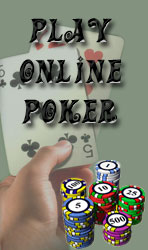Pokerwiner.com → Lessons of poker
BETTING (Or Raising) TO DRIVE OPPONENTS OUT
One step winning a big pot is driving out as many opponents as possible.
Let’s say you are playing seven card stud, and there has been a lot of raising on the first three cards, which has created a big pot.
You have three-of-a-kind, a powerful hands, and now on fourth street the man to your right bets. Should you call or raise?
You should definitely raise even though you are driving out all the weaker hands behind you. Indeed that is precisely the purpose of your raise.
The pot has become sufficiently large for you to try to win it right now, forsaking any futures bets you might win. If everybody folds after you raise, you are delighted.
If your raise succeeds only in cutting down the number of opponents, that’s still pretty good.
Most people don’t think in terms of this special case of the Fundamental Theorem of Poker, but it is vital.
Wanting to win the present pot instantly even with the best hand depends on your chances of winning if the hand continue and upon the pot odds you are giving your opponents. You must ask yourself whether an opponent would be correct to take those odds knowing what you had.
If so, you would rather have that opponent fold. IF not that is, if the odds against your opponent’s making a winning hand are greater than the pot odds he’s getting then you would rather have him call.
In this case, instead of winning the pot right away, you’re willing to take the tiny risk that your opponent will outdraw you and the try to win at least one more bet.
If, in the seven-stud example of the preceding paragraph you had four of a kind instead of three-of-a-kind, you would not want to put in a raise to drive people out. Your hand is so good you’d want to collect a few more bets with it.
It’s rare to catch a monster hand like four of a kind in the first four or five cards. With just about anything less than that, you should try to win large pots right away instead of letting players in cheaply or free card.
Nor do the pots you go after have to be gigantic, just fairly large relative to the betting structure of the game you’re playing.
Your opponent or opponents may fold after you bet or raise, but while you might have won another bet or two, you still have the reward of having locked up a good-sized pot.
BETTING (Or Raising) WITH THE SECOND-BEST HAND
There is a curious corollary to the principle of trying to win the big pots right away. Obviously you want to bet or raise to drive out as many players as possible when you have the best hand.
But if the pot is very large, it is frequently desirable to do the same even when you suspect you have the second-best hand, especially when you believe you’re not that far behind. G-t-and-b-frequency.
A good example of this concept comes up in razz:




Player A




Player B




Player C




You
You have four cards to an 8, and you suspect the poker player to your right, Player C, has four to a 6. If there are a few raises on third street, creating a good-sized pot, it is important that you raise the 6, 4 when he comes out betting, even though his hand is probably better than yours and he will probably reraise.
Why should you be willing to add two bets to the pot when you suspect you don’t have the best hand? The answer is that you want to force out the other two hands.
With a large pot they might call a single bet, but in the face of a bet, a raise, (and a probable reraise), they should now fold.
You have succeeded in reducing the opposition to one, and you now have about a 45 percent chance of winning the pot. Your underdog status is more than comp0ensated by all that extra dead money in there.
On the other hand, with the other players involved, you would have only about a 30 percent chance of winning the pot.
Let’s look at a similar situation in seven card stud. You have two queens and the raising on third street has produced a large pot. The man to your immediate right has




Your hand may or may not be the best hand. You don’t think it is, but you are quite sure it is second-best and not much of an underdog.
If the man to your right with the K ![]() 9
9 ![]() come out betting on fourth street, you should raise to drive the other players out.
come out betting on fourth street, you should raise to drive the other players out.
In the event your two queens is the best hand because the K ![]() 9
9 ![]() is a four-flush or two 9s, you don’t have to worry about any of the other players out drawing you.
is a four-flush or two 9s, you don’t have to worry about any of the other players out drawing you.
On the other hand, if the K ![]() 9
9 ![]() is in fact two kings, you have a better chance of winning the pot against him alone than you would if you let in other players who could outdraw you even if you made queens up or three queens.
is in fact two kings, you have a better chance of winning the pot against him alone than you would if you let in other players who could outdraw you even if you made queens up or three queens.
The same principle comes up in holdem. The man to your right bets, putting you in a position to raise immediately to make other people fold. When the pot is large, you should do it with a good hand even if you suspect it might not be the best.



